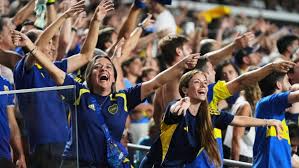Why Argentine club Boca Juniors’s fans have invaded Miami, and why they said sorry to Messi at Club World Cup

As the FIFA Club World Cup kicked off in the U.S., Miami Beach became an unexpected centerpiece. Boca Juniors fans flooded the area in massive numbers. Their mission? To turn the calm coastline into a vibrant celebration of Argentine football.
They called it a “banderazo”, a tradition deeply rooted in their culture. The beach was quickly draped in blue and gold. Fans waved flags, played drums, and even cooked Argentine asado. The festive takeover wasn’t just for fun—it was a loud show of unity and pride before Boca’s first match at Hard Rock Stadium.
What Is a Banderazo?
In Argentina, a banderazo is more than just a rally. It’s a symbolic show of power and passion. Supporters gather outside stadiums, hotels, or even airports to energize their team. It often happens before big matches.
This time, the Boca faithful brought the tradition across the ocean. They turned Bark Beach into “Boca Beach,” and the energy was undeniable. Their aim was clear: to support their team and make their presence felt on U.S. soil.
A Surprising Gesture: “Sorry, Messi”
Amid the excitement, fans held up signs that puzzled some. Phrases like “Perdón, Messi” (Sorry, Messi) were spotted on several banners. But why?
The answer lies in the past—specifically, in 2015. That year, River Plate (Boca’s rival) played Barcelona in the Club World Cup final. Lionel Messi scored a goal and led his team to victory. But some River fans reacted poorly. At Tokyo’s Narita Airport, they insulted and spat at Messi.
The moment was widely condemned. River Plate officials issued a formal apology. Messi, in return, made a small but respectful gesture—he raised a hand toward River fans during the game. It was his way of acknowledging their support, even in defeat.
Why Boca Fans Brought It Up in 2025
Although Boca fans weren’t involved in the 2015 incident, they used this year’s Club World Cup to express regret. Many fans today also cheer for Argentina’s national team. For them, Messi is not just a rival; he’s a national treasure.
In recent years, public appreciation for Messi in Argentina has grown. After leading the national team to Copa América and World Cup victories, his status became untouchable. So, this visible apology was a heartfelt tribute—an attempt to say “you deserve better” from all Argentine fans.
Boca’s Presence Transforms Miami into a Football Carnival
What unfolded in Miami was much more than a fan rally. It was a cultural wave. Local residents watched in awe as Boca’s followers danced, sang, and invited others to join.
Even for those unfamiliar with Argentine football, the energy was magnetic. It wasn’t just about winning a match. It was about showing the world what Boca Juniors represents—passion, loyalty, and unity.
A Bigger Stage: Club World Cup Expansion
This year’s Club World Cup features an expanded format. More teams, more games, and more global eyes. For clubs like Boca Juniors, it’s a golden opportunity to show they can compete beyond South America.
European teams often dominate the headlines. However, Boca’s strong fan presence reminds everyone that South American football still carries immense weight. Their supporters could become the team’s secret weapon, creating an intense, home-like atmosphere—even in foreign stadiums.
Football Without Borders
Football has become a global language. Boca Juniors’ fans in Miami proved that loyalty knows no limits. From Buenos Aires to Florida, they brought their culture, their chants, and their love for the game.
At the same time, their apology to Messi showed maturity. It bridged club rivalries for a larger cause—respecting a national icon.
Final Thoughts
Boca Juniors fans didn’t just watch the Club World Cup unfold—they became part of it. Their transformation of Miami Beach into “Boca Beach” was symbolic, bold, and deeply emotional.
In doing so, they reminded the world that football is more than sport. It’s about memories, mistakes, forgiveness, and unity. And in their own loud, colorful way, they said both “Vamos Boca” and “Gracias, Messi.”






